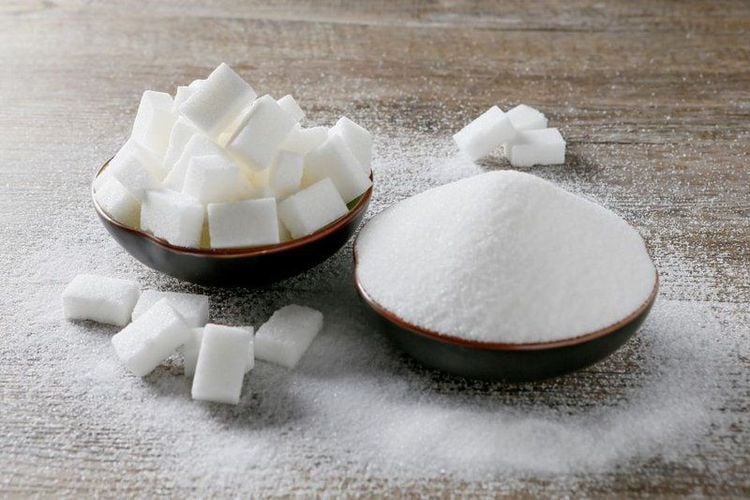This is an automatically translated article.
Sugar is an essential substance for the body's functioning, but eating too much sugar can lead to health problems such as overweight, obesity, diabetes,... That's why you need to be careful when Use sugar for your baby to avoid bad effects on your baby's health in the future.
1. How much sugar is for children?
Right from birth, children naturally like sweetness. Children also love energy-dense foods. However, the choice of food, taste is not only influenced by genetics, but it is also influenced by parents and culture.
When starting solids, babies will accept that basic tastes can vary between breastfed and formula-fed babies. Formula-fed babies are exposed to flavors continuously, mainly sweetness, and the exposure is more or less dependent on the variety of formulas consumed by babies.
Breastfed babies will receive a milder sweetness than formula milk and exposure to different flavors will depend on the mother's nutrition and diet.
The older children are, the more afraid they are to get used to new foods, especially sour foods, vegetables and proteins. But if the child is exposed early and is varied, repeated many times, the child will soon adapt to a variety of flavors. Therefore, right from the beginning of complementary feeding, you should give your child a variety of foods with different types of food.
According to Public Health England (PHE), the maximum recommended amount of sugar for children depends on their age. Specifically:
Children from 4 to 6 years old: 19g sugar (5 teaspoons). Children 7 to 10 years old: 24g sugar (6 teaspoons). Children 11 years and older: 30g sugar (7 teaspoons). There is no nutritional need for free sugars in infants, children, and adolescents. If possible, use sugar for babies under 1 year old in its natural form such as breast milk, unsweetened dairy products such as yogurt and whole fresh fruit.

Cần lưu ý khi sử dụng đường cho bé để tránh những tác động xấu đến sức khỏe
2. The risks of excess sugar for children
Recent studies have warned that a 10-year-old is consuming 1.8 times more sugar than usual.
Sugar is an essential substance for our body, it helps in energy metabolism. However, using too much sugar can lead to an excess of calories, causing overweight and obesity and a number of other health problems in children.
Too much sugar in your baby's diet, especially free sugar in the form of water, has been linked to a range of short and long-term health conditions such as:
Cardiovascular disease, type 2 diabetes: Childhood, childhood, and adolescence Consuming too much fructose (added sugar) has a high risk of cardiovascular disease and type 2 diabetes. Teeth: Especially liquid sugar can cause tooth decay, tooth wear (resulting from acid erosion). Weight, obesity: Consuming a lot of sugar (free sugar) in drinking water, industrial soft drinks has a high risk of weight gain. Digestive disorders: In healthy children, consuming too much, even not much in sensitive children (including sugar from juice) can lead to gastrointestinal manifestations such as chronic diarrhea, flatulence, abdominal distension, abdominal pain, growth retardation. Nutritional deficiency: Sugar increases satiety, limits the amount of food and milk eaten, thereby reducing the quantity and quality of the diet; Calcium, iron, vitamins are not enough compared to the needs, causing growth retardation, micronutrient deficiency. When children consume free sugars in the form of water, there will be no increase in satiety compared to the equivalent amount of sugar in the solid form. Therefore, when children use free sugar in liquid form, it is easy to eat and consume too much energy compared to using solid form.
If children use sugar > 20% of total energy needs, there is a risk of increased blood cholesterol and triglycerides, affecting glucose metabolism and insulin response of the body.

Có nhiều rủi ro từ việc dư thừa đường cho trẻ em
3. Notes when using sugar for babies
With the above health risks, the most important thing now is that you need to adjust and gradually reduce the amount of sugar for your baby in daily activities accordingly. Here are a few easy ways to cut down on sugar without forcing your child to give up treats:
Instead of giving your child sugar-sweetened carbonated drinks, offer water or unsweetened fruit juice to your child. . You can also dilute the juice with soda to make a carbonated drink for your child. Substitute biscuits for a range of low-sugar baked goods and malt cakes for children to reduce sugar intake. You can also give your child low-fat ice cream, bananas or low-fat cottage cheese to serve. You need to check the nutritional value ingredients on the products you intend to buy for your child to be able to choose the foods with the least sugar that are most suitable. Try halving the amount of sugar in your recipes and opt for fruit preserved in juice instead of using syrup. In the process of choosing breakfast cereals for children, prioritize whole grains over those topped with sugar or honey. Some recommendations on the use of sugar for children :
Sugary foods should be consumed as part of a main meal, not a snack. Sugary drinks should not be given to infants and should not be made into the habit of feeding and sleeping with a bottle containing sugary drinks or milk. Children who are overweight and obese should be given free sugar in their diets. This is an important part of reducing energy consumption, helping children lose weight. The recommended drink for children is water. Sugary drinks should be gradually reduced and replaced with water. Do not use industrial soft drinks and fruit juices as a substitute for daily water. Do not let children use sugary drinks between meals, doing so will make children anorexia, skip meals. In short, sugar is an essential substance for the body, it helps the body metabolize energy. The use of too much sugar can lead to excess calories, causing overweight and obesity and a number of other health problems in children. Therefore, parents should gradually reduce drinks and foods containing a lot of sugar in the child's nutritional menu.
Please dial HOTLINE for more information or register for an appointment HERE. Download MyVinmec app to make appointments faster and to manage your bookings easily.













